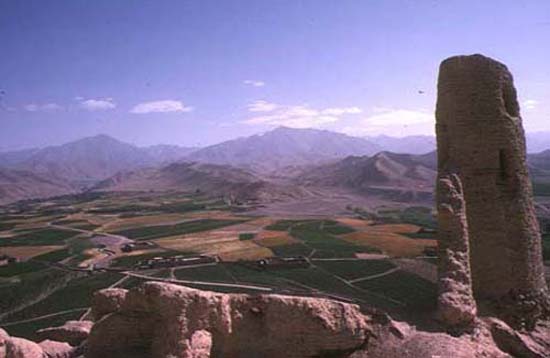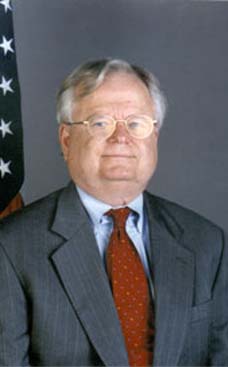
Afghanistan has slipped backward into a political "danger zone," the Center for Strategic and International Studies warned in March. In the broadest published evaluation of Afghans' attitudes, the center said Afghans are facing worsened physical security; greater threats from warlords, criminal gangs and corrupt officials; and more difficulty in supporting their families. In the battle against the Taliban for Afghans' hearts and minds, "support for America and for [Afghan President Hamid] Karzai is becoming less every day," said Eissa Wahdat, an Afghan government engineer who coordinates small development projects in Nuristan. Journalist James Rupert, head of Newsday's international bureau in Islamabad, Pakistan began his career abroad as a Peace Corps volunteer, teaching mechanics and welding in Morocco.
James Rupert writes: US loses ground as Afghanistan erodes
U.S. loses ground as Afghanistan erodes
By James Rupert
Newsday
Some say support for Afghan President Hamid Karzai and the U.S. is weakening.
PARUN, Afghanistan — The warnings have been coming for months to the craggy mountains of northeastern Afghanistan: Taliban militants are eager to step up the war in the province of Nuristan, with its guerrilla-friendly terrain of thick pine forests.
Nearly six years after the United States toppled the Taliban regime in the wake of Sept. 11, Nuristan, like the rest of the country, has no effective government.
For this small province that is home to about 750,000 people, Gov. Tamim Nuristani authorized 300 police officers. When he begged to hire 180 men as auxiliary officers last year to help stop guerrillas infiltrating from Pakistan, the government agreed, but then said it had no money for salaries and fired them.
As one of Afghanistan's most isolated provinces, Nuristan lacks government and police even more than other areas. But it reflects broad failures that scholars say explain growing signs that the United States is losing ground in this war.
Afghanistan has slipped backward into a political "danger zone," the Center for Strategic and International Studies warned in March. In the broadest published evaluation of Afghans' attitudes, the center said Afghans are facing worsened physical security; greater threats from warlords, criminal gangs and corrupt officials; and more difficulty in supporting their families.
In the battle against the Taliban for Afghans' hearts and minds, "support for America and for [Afghan President Hamid] Karzai is becoming less every day," said Eissa Wahdat, an Afghan government engineer who coordinates small development projects in Nuristan.
Visits this year to both sides of the northern Pakistani-Afghan border illustrate a number of reasons cited by analysts for the erosion of the U.S.-led effort to stabilize Afghanistan:
Force size
Nearly six years on, the total of American troops and police backing the Afghan government remains less than 10 percent of what leading counter-insurgency analysts say is needed. Iraq has sucked away troops, money and policymakers' attention, analysts say. And, U.S. officials concede, the U.S. will be unable to add significant forces here as long as Iraq ties down its current 169,000 U.S. troops.
Pakistan's role
The U.S.'s declared ally, Pakistan, is playing a double role that has made it a sanctuary where jihadist guerrillas can recruit and train fighters, raise money and infiltrate Afghanistan. Since 2001, Pakistan has arrested many al-Qaida leaders and has fitfully confronted home-grown jihadists. Still, it tolerates a broad support network for Taliban and other guerrillas that includes active-duty members of Pakistan's security forces.
So far, Karzai's government and the United States have been fortunate in northeastern Afghanistan. Local tribes, notably in Nuristan province, are historic rivals of the ethnic Pashtuns who dominate the Taliban movement, and they tend to resist the Taliban's calls for jihad.
advertising
But, said the Afghan government engineer Wahdat and others, that natural advantage is being squandered because the government and its foreign backers have failed to establish schools, clinics, police forces and other services to meet even basic needs of people scattered in Nuristan's roughly 300 mountain villages. The resulting vacuum, and the depth of people's need, lets Islamic extremists keep deepening their roots here.
Breeding insurgency
While the government operates almost no schools in Nuristan, the Saudi-based World Muslim League and other Arab religious foundations pay salaries for hundreds of mullahs, missionaries and madrassa teachers, said Abdulhai Warshan, a Nuristani journalist for the Afghan service of Voice of America radio. This Islamist network has been rooting itself in every district of Nuristan since the 1980s, when Arabs (and the U.S. government) helped fund the Afghan guerrilla war against the 1979 Soviet invasion of Afghanistan.
With Nuristanis increasingly eager to educate their children, and no government schools in sight, "the Arab madrassas [religious schools] have offered free religious teaching" according to the Saudis' fundamentalist Wahhabi doctrine, Warshan said. For a quarter-century, "it has been the only way ordinary people could educate their sons, and now Wahhabism and extremism have penetrated our area."
Lack of police
Of the many failures of government, the most critical is the absence of police, many analysts say. In each of nine provinces visited by Newsday in the past year, police posts were undermanned, policemen had as few as 20 bullets per gun and they reported going unpaid for months at a time.
Nuristan and neighboring Kunar province abut Pakistan, from where Islamic militants easily send fighters and weapons over the border. Unable to hire police, Nuristan's governor has been reduced to touring villages and begging councils of elders to organize their defenses.
In Kunar, police "have not been paid in six months," said Abdulwali Khan, chairman of the province's embryonic legislature.
"But the Taliban will pay them" to fight against the government. "We tell the police that they must not quit ... that the Holy Quran counsels patience," he said.
After years of poorly coordinated police-training efforts by the German and U.S. governments, "We have no real grasp of what actual [police] presence exists" in Afghanistan's 355 local districts, retired U.S. Army Gen. Barry McCaffrey wrote in a memo at the U.S. Military Academy at West Point, where he teaches.
"The effort to create the Afghan police is ... grossly under-resourced," McCaffrey said after touring Afghanistan in February.
Nation-building
In 2001, the small U.S. engagement seemed successful when just a handful of Special Operations troops and CIA officers wooed or paid warlords to join in toppling the Taliban regime with help from U.S. air power.
But, preparing to invade Iraq and disdainful of nation-building efforts, the Bush administration "put aside what we had learned" from recent interventions in Haiti, Bosnia and Kosovo, said James Dobbins, the administration's first ambassador to post-Taliban Afghanistan.
Those 1990 interventions relied on large peacekeeping forces to keep shattered societies from unraveling. But the U.S. vetoed requests by its ally, Karzai, and by the United Nations for a broad peace force to secure the country. That left Karzai to cut deals with warlords, many of them corrupt and brutal, to seek a degree of power for his government in the provinces.
While Bosnia was stabilized by the deployment of 60,000 foreign troops (about one for every 50 local citizens), Afghanistan for two years had only 5,000 peacekeepers in Kabul (one per 5,600 Afghan citizens), all based in Kabul.
The security vacuum let the Taliban reignite an insurgency, beginning in 2003. In response, the U.S. has increased the U.S. force here to 27,000 and pulled in other troops, most from NATO allies. But with a guerrilla war now widespread, even the current 35,000-strong International Security Assistance Force here is not nearly big enough, said Chris Mason, a retired U.S. diplomat and Afghan specialist.
Money is scarce
Money for reconstruction is lacking as well. The RAND Corp. research group noted in 2003 that, in the first two years after their wars ended, Bosnia received $1,390 per citizen in international aid, while Afghanistan got only $42 per capita. The United States vowed in February to boost its aid to more than $10 billion for 2007 and 2008, but the cost of the now-escalated wars on the Taliban and revived heroin trafficking will leave little or no increase for reconstruction, a Congressional Research Service study said.
The Bush administration voices determined optimism on the Afghan war. In "five years ... we have made impressive progress — kids in school, thousands of kilometers of roads, extending ... institutions of government — but we recognize we have many challenges still to overcome," Assistant Secretary of State Richard Boucher told Congress earlier this year.
Copyright © 2007 The Seattle Times Company



















